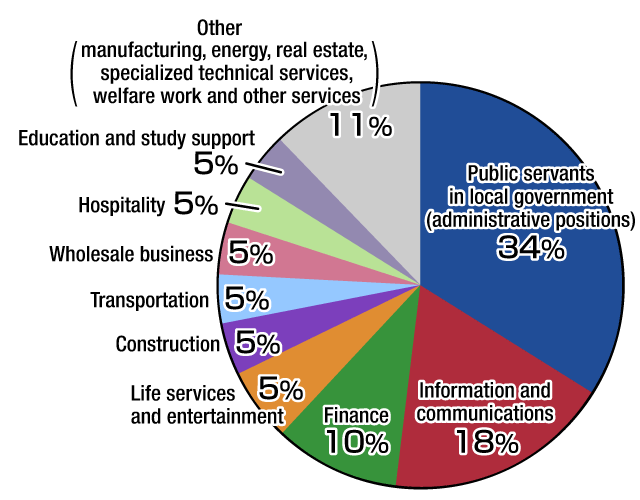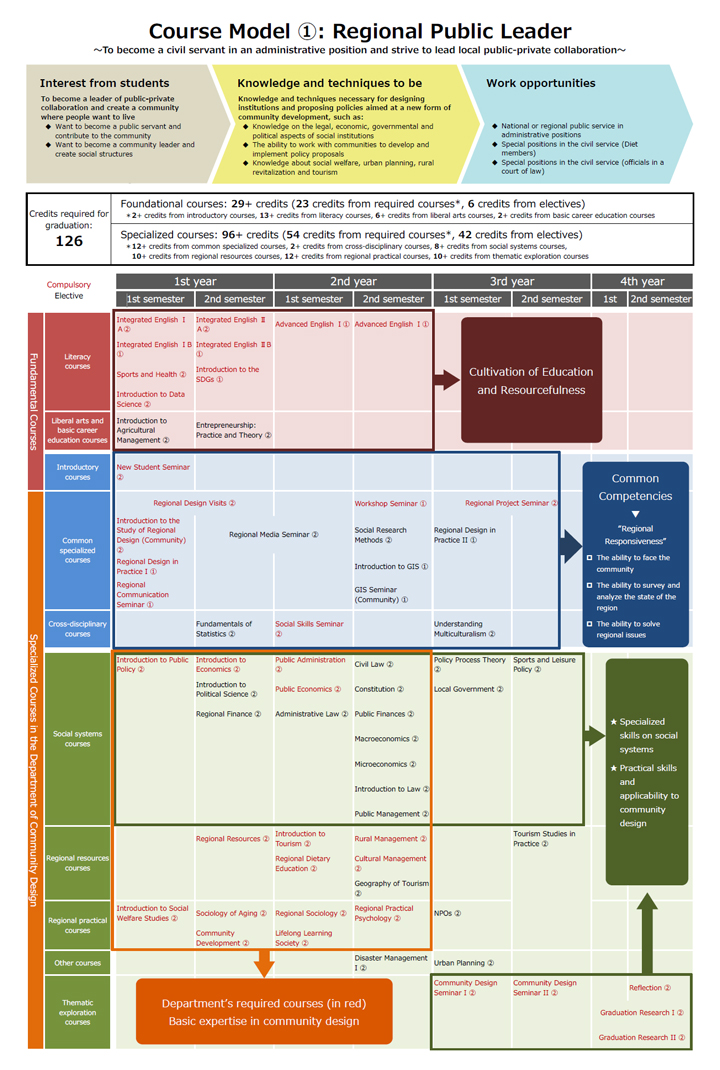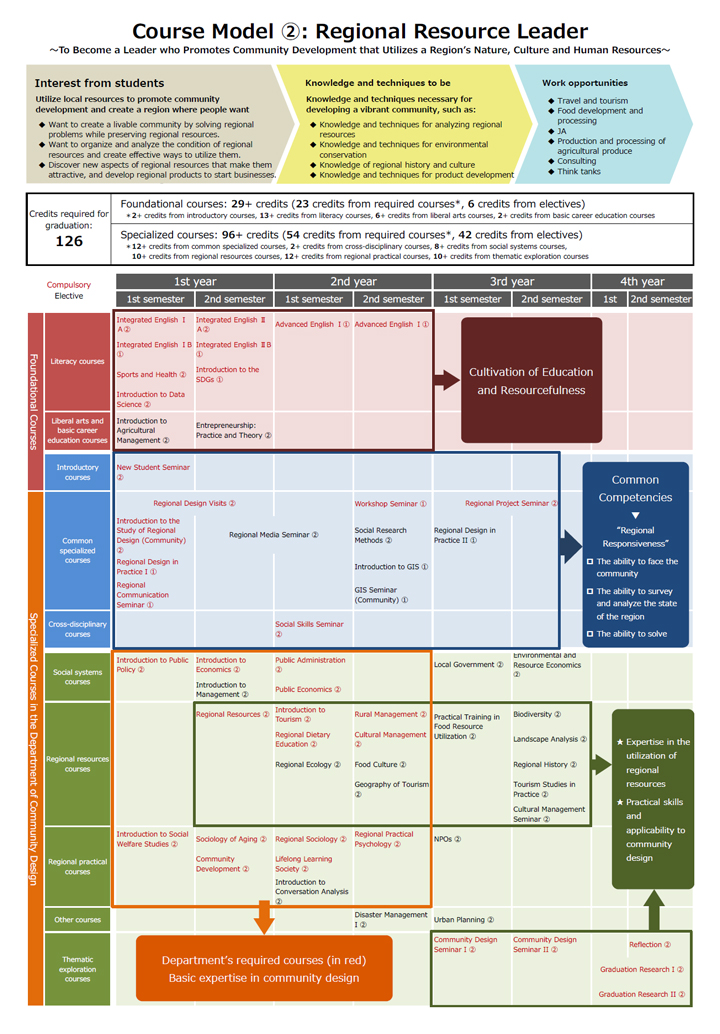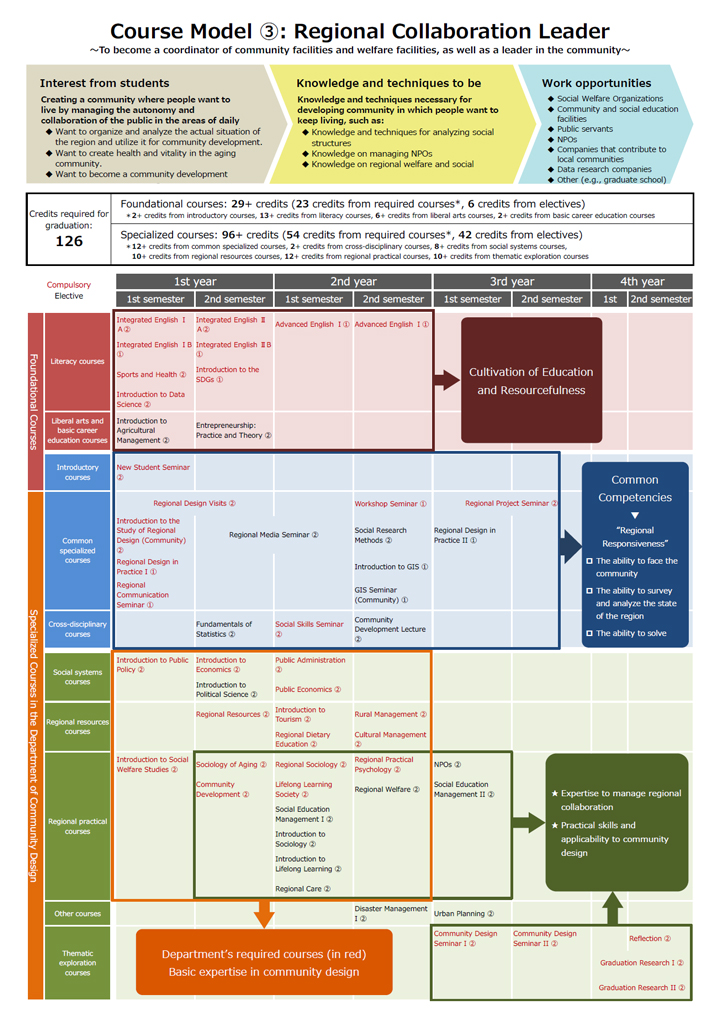Career Paths and Employment Opportunities

Career Trends of the First Graduates

Having produced its first graduates in March 2020, the Department of Community Design is a young academic department. Nevertheless, each of the students experiences growth through their studies, practical experiences in the regions, extracurricular activities, part-time jobs, and encounters with other people, enabling them to take their first step towards realizing their own careers.
Here we will describe the career trends based on where (i.e., which industry) the first graduates from this program found employment. Out of those who graduated in March 2020, 100% of those who wished to find employment managed to do so. Of all the job placement destinations, the highest proportion consisted of prefectural and city offices both inside and outside Tochigi Prefecture, where 34% of the job-seeking graduates found employment as public servants in administrative positions. This was followed by 18% in the information and communications industry, including TV stations, newspapers, and IT companies; 10% in the financial industry, including banks; and 6% in the life service and entertainment industry, including travel agencies. Other industries include construction, transportation, wholesale trade, accommodation and food services, and education and learning support, indicating the broad range of industries in which graduates have embarked on their career paths.
While 98% of the first graduates sought employment after graduation, it is also entirely possible to go on to graduate study, including at the Graduate School of Regional Development and Creativity.
NB: While some students received multiple job offers, we have only included the positions they ultimately accepted within our calculations. Our figures do not consider the job offers they received while searching for employment. Starting from April 2020, the final track record of job placements will be reported on the website and during the open campus events.
The curriculum of the Department of Community Design provides students with the specialized knowledge and experience to design regions (communities) by “connecting strength with strength” and “supporting regions.” The following occupations can offer career paths that utilize this knowledge and experience.
Course Model 1 Regional Public Leader
~Become a Leader of Regional Public-Private Cooperation Through Employment as an Administrative Public Servant~
Interests
Become a leader of regional public-private cooperation and create a region where people want to continue living
- Want to become a public servant and contribute to the community
- Want to become a community leader and create social structures
Knowledge and techniques you can acquire
Knowledge and techniques necessary for designing institutions and proposing policies aimed at a new form of community development, such as:
- Knowledge on the legal, economic, governmental and political aspects of social institutions
- The ability to work with communities to develop and implement policy proposals
- Knowledge about social welfare, urban planning, rural revitalization and tourism
Main relevant courses
Social systems courses
Introduction to Public Policy, Introduction to Economics, Public Administration, Public Economics, Introduction to Political Science, Microeconomics, Macroeconomics, Introduction to Law, Constitutional Law, Civil Law, Local Government, Policy Process, Administrative Law, Public Management, Sports and Leisure Policy, Fiscal Studies, Environmental and Resource Economics

Curriculum Table (PDF)
You can expect to work in the following fields
- National or regional public service in administrative positions
- Special positions in the civil service (National Diet members, officials in a court of law, national tax specialists, etc.)
- Finance and insurance
- Public utilities, etc.
Course Model 2 Regional Resource Leader
〜To Become a Regional Leader who Promotes Community Development that Utilizes a Region’s Nature, Culture and Human Resources〜
Interests
Utilize local resources to promote community development and create a region where people want to continue living
- Want to create a livable community by solving regional problems while preserving regional resources.
- Want to organize and analyze the condition of regional resources and create effective ways to utilize them.
- Discover new aspects of regional resources that make them attractive, and develop regional products to start businesses.
Knowledge and techniques you can acquire
Knowledge and techniques necessary for developing a vibrant community, such as:
- Knowledge and techniques for analyzing regional resources
- Knowledge and techniques for environmental conservation
- Knowledge of regional history and culture
- Knowledge and techniques for product development
- Knowledge required to start businesses
Main relevant courses
Regional resources courses
Regional Resource Theory, Regional Food Education, Rural Management, Introduction to Tourism, Cultural Management, Regional Ecology, Food Culture Theory, Tourism Geography, Food Resource Utilization Practice, Tourism Practice, Regional History, Biodiversity Theory, Landscape Analysis, Cultural Management Seminar

Curriculum Table (PDF)
You can expect to work in the following fields
- Travel and tourism
- Food development and processing
- JA
- Successors in agricultural production and processing
- Consulting
- Think tanks
- Start-up ventures
Course Model 3 Regional Collaboration Leader
~To become a coordinator of community facilities and welfare facilities, as well as a leader in the community~
Interests
Creating a community where people want to live by managing the autonomy and collaboration of the public in the areas of daily life and community welfare
- Want to organize and analyze the actual situation of the region and utilize it for community development.
- Want to create health and vitality in the aging community.
- Want to become a community development coordinator and work on solving local issues.
Knowledge and techniques you can acquire
Knowledge and techniques necessary for developing community in which people want to keep living, such as:
- Knowledge and techniques for analyzing social structures
- Knowledge on managing NPOs
- Knowledge of regional welfare and social education
- Techniques for coordinating collaborative efforts
Main relevant courses
Regional practical courses
Community Development, Sociology of Aging, Lifelong Learning Society, Community Sociology, Psychology of Community Practice, Introduction to Lifelong Learning, Introduction to Sociology, Introduction to Social Welfare, Introduction to Management, Community Welfare, Social Education Management I, Social Education Management II, NPO Theory, Introduction to Conversation Analysis, Contemporary Japanese Society, Stress Management Community Care

Curriculum Table (PDF)
You can expect to work in the following fields
- Social Welfare Organizations
- Community and social education facilities
- Public service
- NPOs
- Companies that contribute to local communities
- Data research companies
- Other (e.g., graduate school)
